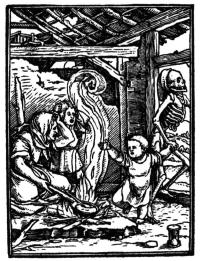|
First Women Executed in NH |
|
Page 3 of 5
A WARNING TO ALL OTHERS (continued)
Death, Reprieve & Condemnation
 This law sealed the fate of Penelope Kenny and Sarah Simpson, who were convicted by a jury of “twelve good and lawful men” of “feloniously concealing the death of a…infant bastard child” on August 30, 1739. (19 ) Presiding over the proceedings were four Justices of the Superior Court, including Henry and Joseph Sherburne, Ellis Huske, and Nicholas Gilman, who all played an intimate role in Governor Belcher’s controversial administration during the 1730s. (20 )
This law sealed the fate of Penelope Kenny and Sarah Simpson, who were convicted by a jury of “twelve good and lawful men” of “feloniously concealing the death of a…infant bastard child” on August 30, 1739. (19 ) Presiding over the proceedings were four Justices of the Superior Court, including Henry and Joseph Sherburne, Ellis Huske, and Nicholas Gilman, who all played an intimate role in Governor Belcher’s controversial administration during the 1730s. (20 )
The trials were “long, tedious and attended with much trouble and difficulty,” and over thirty witnesses were summoned to testify. (21 ) There was some uncertainty, however, concerning the extent of Simpson’s and Kenny’s crimes. Jabez Fitch remarked that both women “deny’d that they laid violent hands on their children…one affirming that her child was dead born…and the other, that hers dy’d soon after it was born.” But there were no witnesses to confirm their stories, and for Reverend Fitch this was irrelevant because “both seem’d sensible of their neglect of taking due care to preserve the life of their children.” (22) Indeed, authorities recognized their actions not only as irrefutable evidence of sexually deviant behavior, but also as an affront to the existing social order that could not go unpunished. ( 23) And it is also possible that memories of the “awful Calamity” that claimed the lives of so many innocent children three years earlier made the crimes of Sarah Simpson and Penelope Kenny even more appalling, and ultimately convinced Chief Justice Henry Sherburne and his colleagues to sentence both women to be “hanged up by the Neck until her body be dead” on November 21, 1739. (24 )
But in the days that followed this unprecedented judgment, Simpson and Kenny were “persuaded by some indiscreet persons who came to visit them, that their sentence was rigorous and unjust, and…they might obtain a reprieve so as to be finally executed from suffering.” (25 ) A petition was sent to Governor Belcher, and on November 12, he signed an order that postponed the executions until December 27. Exactly why he granted their request is unclear, but that the two condemned women “expressed a sorrowful & penitent sense of their crime” may have helped their case. (26 )
The “mournful spectacle” that unfolded in Portsmouth in December 1739 reflected a public ritual of execution that was practiced in New England from the early colonial era well into the nineteenth-century. (27 ) That morning, Sarah Simpson was brought from the jail to the South Church, where Reverend William Shurtleff preached an “execution” sermon. (28 ) Penelope Kenny also spent the dwindling hours of her life at Queen’s Chapel across town listening to Reverend Arthur Browne, who “had privately visited and assisted” her during the days leading up to her execution. (29 )
Two prominent, but conflicting, themes emerge from their sermons. The ministers were quick to use the example of the doomed women to remind their listeners of the spiritual ignorance and sins of the flesh that could damn any soul. “May her untimely End influence you all,” warned Arthur Browne, “to lay fast hold on Instruction; may her Example and Sufferings answer the Intention of Law, and deter all viciously and wickedly disposed persons among you from incurring the like condemnation.”(30) William Shurtleff also took the opportunity to remind his congregation that the “neglect and abuse of God’s Sabbaths (which the condemned person here present reflects upon with so much regret)…very often lead to Capital Crimes.”
But just as Penelope Kenny and Sarah Simpson were portrayed as criminals, they also became objects of empathy, pitiful sinners who acknowledged the terrible nature of their crimes, and were eager to repent. William Shurtleff discussed the case of the “poor Prisoner” with “the tenderest Bowels of Compassion, and the deepest Concern of Soul,” and Arthur Browne asked, “But why should I…upbraid or insult this poor Malefactor! She is convinced I trust of the heinousness of her Sins, and may her Preparation and Repentance avail her in the Day of the Lord.” (31) But when the sermons had ended, the final chapter of this historical tragedy was just beginning.
CONTINUE with A WARNING TO ALL OTHERS
Please visit these SeacoastNH.com ad partners.



 Smuttynose Murders
Smuttynose Murders



 This law sealed the fate of Penelope Kenny and Sarah Simpson, who were convicted by a jury of “twelve good and lawful men” of “feloniously concealing the death of a…infant bastard child” on August 30, 1739. (19 ) Presiding over the proceedings were four Justices of the Superior Court, including Henry and Joseph Sherburne, Ellis Huske, and Nicholas Gilman, who all played an intimate role in Governor Belcher’s controversial administration during the 1730s. (20 )
This law sealed the fate of Penelope Kenny and Sarah Simpson, who were convicted by a jury of “twelve good and lawful men” of “feloniously concealing the death of a…infant bastard child” on August 30, 1739. (19 ) Presiding over the proceedings were four Justices of the Superior Court, including Henry and Joseph Sherburne, Ellis Huske, and Nicholas Gilman, who all played an intimate role in Governor Belcher’s controversial administration during the 1730s. (20 ) 














